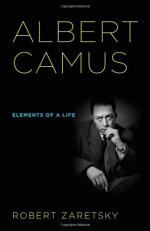|
This section contains 1,182 words (approx. 4 pages at 300 words per page) |

|
The works of Camus, as they stand interrupted by fate, utter a pagan message which is to be set beside that of the great pagans of antiquity and that of some of the modern pagans to whom Christianity owes an immense debt of gratitude—for they have asked the right questions and constrained Christians to evolve ever more satisfactory answers to them. "Neo-paganism is the great spiritual phenomenon of our age"—thus wrote, in The Drama of Atheistic Humanism (1944), the eminent Jesuit thinker, Father Henri de Lubac, who deplores it, but courageously concedes that many noble souls, indeed many "blinded Christian souls" are attracted to the renovated paganism of today.
Instinct and doctrine blend in Camus's pagan assertions. His early series of essays, Noces (Nuptials), sings a paean to the wedding-feast of sky, sea, and the Algerian earth, supplemented by several equally rapturous prose canticles in honor of...
|
This section contains 1,182 words (approx. 4 pages at 300 words per page) |

|


